Gender Equality National Report Hungary - European-microfinance ...
Gender Equality National Report Hungary - European-microfinance ...
Gender Equality National Report Hungary - European-microfinance ...
You also want an ePaper? Increase the reach of your titles
YUMPU automatically turns print PDFs into web optimized ePapers that Google loves.
The professional apparatus of the administration, which is responsible for enterprise<br />
promotion, did not always devote the necessary attention to SME development programs,<br />
they fail to sufficiently appreciate the indirect ways of supporting enterprises and the<br />
significance of mediating and service providing institution.<br />
In the recent period, the administrative and financial burdens of starting, operating or<br />
liquidating a business were significant. After recognising this, the government introduced a<br />
reform in the area, which resulted in setting up an enterprise becoming much simpler and<br />
faster from September 1, 2007.<br />
All types of institutes aiming to assist enterprises have already been established in <strong>Hungary</strong>:<br />
• Organizations of the state administration and authorities<br />
• State-owned organizations aiming to develop SMEs<br />
• Non-profit development agencies (NGOs)<br />
• Chambers (of commerce and industry, agriculture and special fields etc.)<br />
• Entrepreneurial business federations, trade associations<br />
Although the institution of enterprise development has been long established, it does<br />
not seem to operate efficiently. The operation of the individual organizations is not efficient<br />
enough; it has not helped sufficiently to strengthen the Hungarian SME sector or to make it<br />
more competitive. The target is now to improve the efficiency of the existing<br />
institutions, to enhance the specialization and professionalism of the organizations.<br />
The main reason behind the problem is the parallel finance of the enterprise<br />
promotion programs and that they were made to compete in the past decade. Their<br />
operations were significantly limited by the flaws in the professional preparation, control and<br />
the finance of their programs.<br />
Among the institutes that help and promote the development of enterprises we must<br />
highlight the LEA network consisting of agencies in the counties and in Budapest,<br />
which was specifically established for the development of micro- and small<br />
enterprises by the EU PHARE program. The basic activities of the LEAs, financed by<br />
PHARE, are counselling, training, providing properties (business incubators, industrial<br />
parks), providing microcredit as well as generating development programs.<br />
The obtained experience and the market failures have made it clear that the intermediating<br />
function of the LEAs is necessary. By today, the LEA network has developed its<br />
integrated enterprise promotion program, in which there are several micro-finance<br />
programs building on each other, in addition to training and counselling programs.<br />
Although the external financial sources of enterprises have expanded in the past years, the<br />
companies within the country utilise fewer outer resources to finance their expansion than<br />
their counterparts in the developed countries. Almost 80% of Hungarian enterprises work<br />
without using loans, while in developed countries the proportion is 15-20%.<br />
Even today the notable under-capitalization and lack of resources of micro- and small<br />
enterprises still remain a problem.<br />
Although the competition of credit granting financial institutions has increased in the previous<br />
years, the development of micro-enterprises is almost worrying despite the strong increase in<br />
2006. The total number of loans reaching over the end of year is still much lower than it was<br />
in 2002 and 2003, and it is infinitesimal compared to the number of micro-enterprises.<br />
Micro-finance of micro-enterprises that are not bank-worthy has a long history in<br />
<strong>Hungary</strong>. The members of the Hungarian Microfinance Network, the local enterprise<br />
agencies in the counties and the capital city ® (LEAs) - for the first time in <strong>Hungary</strong> and<br />
among the first in Europe - started their micro-finance activities with professional and<br />
financial support from the PHARE SME program in 1992.<br />
6



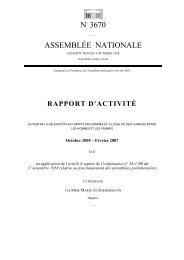
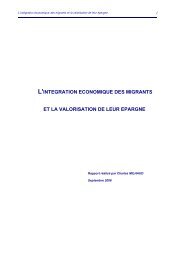
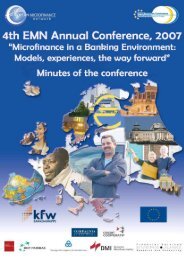
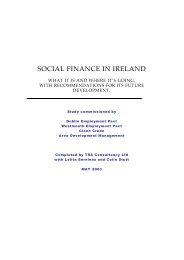

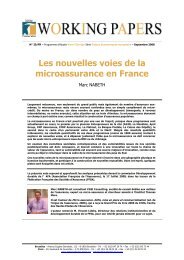


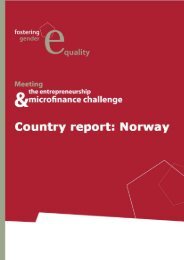

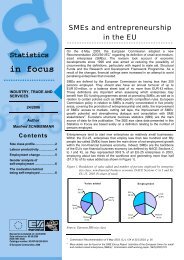
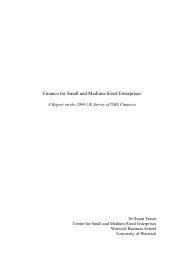
![Joint Report on Social Protection and Social Inclusion [2005]](https://img.yumpu.com/19580638/1/190x132/joint-report-on-social-protection-and-social-inclusion-2005.jpg?quality=85)
